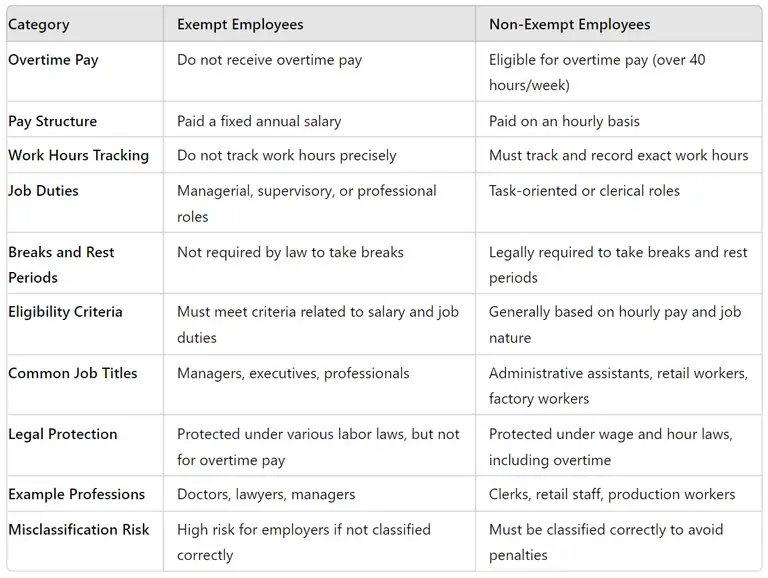Have you ever wondered why some employees get paid extra for overtime while others don't?
The answer lies in the terms "exempt" and "non-exempt."
These classifications impact how your employees are paid and treated at work.
Knowing the differences and similarities between exempt and non-exempt employees can save you from legal trouble and help you manage your team better.
What does exemption mean?

Exemption in the workplace determines whether or not you get paid extra for overtime. The Fair Labor Standards Act (FLSA) lays down the rules for this.
If you're exempt, you don't get overtime pay, no matter how many hours you put in.
If you're non-exempt, you get extra pay when you work over 40 hours a week. Let's break down what it means to be an exempt or non-exempt employee.
Exempt employee: definition
An exempt employee is someone who doesn’t receive overtime pay.
These employees are typically paid a salary rather than by the hour. Their job duties usually involve more responsibility, like managing people or making big decisions.
For example, professional employees like doctors, lawyers, or managers often fall into this category.
They are expected to get the job done, even if it means working beyond the usual hours, and they don’t punch in. Their pay remains the same, whether they work 35 hours or 50 hours a week.
Non-exempt employee: definition
A non-exempt employee receives overtime pay when they work more than 40 hours a week. These employees are usually paid by the hour and must track their work hours carefully.
Jobs like administrative assistants, retail workers, and factory workers are often non-exempt. Their paychecks can fluctuate because they are based on the exact number of hours worked.
Non-exempt employees benefit from wage and hour laws that protect their right to fair pay for overtime.
Exempt vs non-exempt employee: similarities

When it comes to employment, whether you’re classified as exempt or non-exempt, there are some key similarities to keep in mind.
Despite the differences in overtime pay and job duties, exempt and non-exempt employees share several important aspects of their work life.
Employment laws
Both exempt and non-exempt employees are protected under various labor laws.
These laws make sure that workers are treated fairly, regardless of their exempt status.
The Fair Labor Standards Act (FLSA) is a key piece of legislation that plays a key role here, covering aspects such as minimum wage, record-keeping, and child labor provisions.
While the FLSA primarily focuses on whether employees receive overtime pay, its influence extends to most employees across the country.
Basic rights
Every employee, whether paid on an hourly basis or an annual salary, has basic rights that must be respected.
This includes the right to a safe working environment, freedom from discrimination, and the right to report violations without fear of retaliation.
Government agencies are tasked with enforcing these rights, making sure that no worker is subjected to unfair treatment.
Employee benefits
Benefits such as health insurance, retirement plans, and paid time off are typically available to both groups.
Highly compensated employees and those in professional roles might see variations in the specifics of their benefits packages, but the fundamental access to benefits is a common thread.
Pay periods
Both exempt and non-exempt employees are paid according to a regular pay period, whether that's weekly, bi-weekly, or monthly.
This helps maintain a steady income flow, which is essential for financial planning and stability.
For example, a bona fide executive might receive their pay monthly, while an hourly worker might be paid weekly, but both benefit from the predictability of a regular pay schedule.
Exempt vs non-exempt employee: differences

Understanding the differences between exempt and non-exempt employees is key to navigating the world of work.
These differences impact everything from paychecks to daily tasks.
Overtime pay
One of the biggest differences is overtime pay.
Non-exempt employees are eligible to receive overtime pay for any hours worked over 40 in a week. This means they get paid extra for putting in those long hours.
On the other hand, exempt employees don’t receive overtime pay, no matter how many hours they work. This is often because their roles involve more responsibility and higher pay, such as professional employees who are typically on an annual salary.
Salary basis
Exempt employees usually work on a salary basis, meaning they receive a fixed amount each pay period, regardless of how many hours they work.
Non-exempt employees, however, are paid on an hourly basis. This means their paycheck can vary depending on the number of hours they clock in each week.
Job duties
The type of work performed is another major difference. An employee's specific job duties play a huge role in determining whether they are exempt or non-exempt.
Exempt employees often have more managerial or specialized roles. Their job title might include words like "manager" or "executive," and their tasks usually involve making decisions or supervising others.
Non-exempt employees usually have job titles that reflect more hands-on or clerical work, and their duties are more task-oriented.
Work hours and tracking
Non-exempt employees have to track their work hours closely because their pay depends on it. They clock in and out to record the exact time they work.
Exempt employees, however, typically don’t need to track hours so precisely. Their focus is more on completing their job duties rather than the number of hours worked.
Breaks and rest periods
Wage and hour laws require non-exempt employees to take regular breaks and rest periods. These laws ensure they get time to rest and recharge during their shifts.
Exempt employees, however, don’t have the same legal requirements for breaks. Their work schedule can be more flexible, but they also might end up working through breaks if their job demands it.
Eligibility criteria
Eligibility for exempt status is based on several criteria, including salary level and job duties.
Just having a high-paying job title isn't enough - the employee must also perform specific types of work. Misclassifying employees can lead to legal trouble for employers, so it’s important to classify correctly.
For example, just because someone is labeled a "manager" doesn’t automatically make them exempt - their actual job duties need to match the criteria for exempt status.
For more insights, check this comparison table out:

Bonus quiz: can you tell the difference between exempt and non-exempt employees?
1. Which of the following is true about exempt employees?
A) They receive overtime pay.
B) They are paid on an hourly basis.
C) They have more managerial or specialized roles.
D) They must track their work hours closely.
2. What is a key characteristic of non-exempt employees?
A) They have a set salary.
B) They do not receive overtime pay.
C) They are not required to take breaks.
D) They are eligible for overtime pay.
3. Which law primarily determines if an employee is exempt or non-exempt?
A) The Civil Rights Act.
B) The Fair Labor Standards Act.
C) The Occupational Safety and Health Act.
D) The Family and Medical Leave Act.
4. Exempt employees must earn at least how much annually to qualify for their status?
A) $20,000
B) $25,000
C) $35,568
D) $50,000
5. What is a common job duty of exempt employees?
A) Performing clerical tasks
B) Making decisions or supervising others
C) Operating machinery
D) Performing repetitive tasks
6. Do non-exempt employees typically need to track their work hours?
A) Yes, because their pay depends on it.
B) No, they do not need to track hours.
C) Only if they work overtime.
D) Only if requested by their manager.
7. Can a job title alone determine if an employee is exempt?
A) Yes, job titles are sufficient.
B) No, the specific job duties are what matter.
C) Only for managerial titles.
D) Only for professional titles.
8. Which group of employees is protected by wage and hour laws for overtime pay?
A) Only exempt employees
B) Only non-exempt employees
C) Both exempt and non-exempt employees
D) Neither exempt nor non-exempt employees
Correct responses
- C) They have more managerial or specialized roles.
- D) They are eligible for overtime pay.
- B) The Fair Labor Standards Act.
- C) $35,568
- B) Making decisions or supervising others.
- A) Yes, because their pay depends on it.
- B) No, the specific job duties are what matter.
- B) Only non-exempt employees.
Conclusion
Understanding the differences and similarities between exempt and non-exempt employees is key for managing your business effectively.
How you classify your employees can impact their job satisfaction and your business success.
FAQ
What is the federal minimum wage and overtime pay for exempt vs non exempt employees in the United States?
The federal minimum wage is $7.25 per hour for non-exempt employees. Non-exempt employees must receive overtime pay of 1.5 times their regular rate for hours worked over 40 in a week. Exempt employees are not eligible for overtime pay.
Do exempt employees have a different minimum wage from non exempt employees?
No, exempt employees do not have a different minimum wage. However, to qualify as exempt, their annual salary must be at least $35,568, which is more than the federal minimum wage.
Are exempt employees eligible for overtime pay?
No, exempt employees are not eligible for overtime pay. They receive a fixed salary regardless of the number of hours worked.
Do exempt employees have a set salary?
Yes, exempt employees have a set salary. They are paid the same amount each pay period, regardless of the number of hours they work.

![How To Evaluate HR Transformation Effectiveness [2026 Guide]](/static/image?src=https%3A%2F%2Fcdnblog.unrubble.com%2Fpayload-unrubble-images%2FUnrubble-how-to-evaluate-hr-transformation-effectiveness-2026-guide-180x120.jpg&width=128&height=128&fit=cover&position=center&quality=65&compressionLevel=9&loop=0&delay=100&crop=null&contentType=image%2Fwebp)






